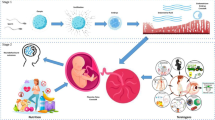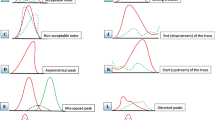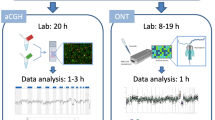Abstract
Purpose
Recently, fetal placenta-specific epigenetic regions (FSERs) have been identified for quantification of cell-free fetal DNA (cff-DNA) for non-invasive prenatal testing (NIPT). The aim of this study was to evaluate the efficiencies of a column-based kit and magnetic bead-based kit for quantification of methylated FSERs from maternal plasma.
Methods
Maternal plasma was extracted from normal pregnant women within the gestational age of 10~13 weeks (n = 24). Total cell-free DNA (cf-DNA) was extracted using a column-based kit and magnetic bead-based kit from the plasma of the same pregnant woman, respectively. Methylated FSERs were enriched from the extracted total cf-DNA using a methyl-CpG-binding domain-based protein method. The four FSERs were simultaneously quantified by multiplex real-time polymerase chain reaction.
Results
Methylated FSERs were detected in all samples extracted from both kits. However, the amplification of FSERs showed significant differences in the extraction efficiency of methylated FSERs between the two extraction methods. The Ct values of methylated FSERs extracted using the column-based kit were significantly lower than those obtained using the magnetic bead-based kit (P < 0.001 for all FSERs). The quantity of methylated FSERs was significantly higher for extracted DNA using the column-based kit than that extracted using the magnetic bead-based kit (P < 0.001 for all FSERs). Time and cost for the process of extraction were similar for the column kit and magnetic bead-based kit.
Conclusions
Our findings demonstrate that the column-based kit was more effective than the magnetic bead-based kit for isolation of methylated FSERs from maternal plasma as assessed by FSER detection.
Similar content being viewed by others
References
Alberry M, Maddocks D, Jones M, Abdel Hadi M, Abdel-Fattah S, Avent N, et al. Free fetal DNA in maternal plasma in anembryonic pregnancies: confirmation that the origin is the trophoblast. Prenat Diagn. 2007;27:415–8.
Lun FM, Chiu RW, Chan KC, Leung TY, Lau TK, Lo YM. Microfluidics digital PCR reveals a higher than expected fraction of fetal DNA in maternal plasma. Clin Chem. 2008;54:1664–72.
Lo YM, Chan KC, Sun H, Chen EZ, Jiang P, Lun FM, et al. Maternal plasma DNA sequencing reveals the genome-wide genetic and mutational profile of the fetus. Sci Transl Med. 2010;2:61ra91.
Illanes S, Denbow M, Kailasam C, Finning K, Soothill PW. Early detection of cell-free fetal DNA in maternal plasma. Early Hum Dev. 2007;83:563–6.
Lo YM, Zhang J, Leung TN, Lau TK, Chang AM, Hjelm NM. Rapid clearance of fetal DNA from maternal plasma. Am J Hum Genet. 1999;64:218–24.
Norton ME, Brar H, Weiss J, Karimi A, Laurent LC, Caughey AB, et al. Non-Invasive Chromosomal Evaluation (NICE) Study: results of a multicenter prospective cohort study for detection of fetal trisomy 21 and trisomy 18. Am J Obstet Gynecol. 2012;207:137.e1-8.
Old RW, Crea F, Puszyk W, Hultén MA. Candidate epigenetic biomarkers for non-invasive prenatal diagnosis of Down syndrome. Reprod BioMed Online. 2007;15:227–35.
Papageorgiou EA, Fiegler H, Rakyan V, Beck S, Hulten M, Lamnissou K, et al. Sites of differential DNA methylation between placenta and peripheral blood: molecular markers for noninvasive prenatal diagnosis of aneuploidies. Am J Pathol. 2009;174:1609–18.
Chu T, Burke B, Bunce K, Surti U, Allen Hogge W, Peters DG. A microarray-based approach for the identification of epigenetic biomarkers for the noninvasive diagnosis of fetal disease. Prenat Diagn. 2009;29:1020–30.
Lee DE, Lim JH, Kim MH, Park SY, Ryu HM. Novel epigenetic markers on chromosome 21 for noninvasive prenatal testing of fetal trisomy 21. J Mol Diagn. 2016;18:378–87.
Lui YY, Chik KW, Chiu RW, Ho CY, Lam CW, Lo YM. Predominant hematopoietic origin of cell-free DNA in plasma and serum after sex mismatched bone marrow transplantation. Clin Chem. 2002;48:421–7.
Lim JH, Park SY, Ryu HM. Non-invasive prenatal diagnosis of fetal trisomy 21 using cell-free fetal DNA in maternal blood. Obstet Gynecol Sci. 2013;56:58–66.
Tong YK, Jin S, Chiu RW, Ding C, Chan KC, Leung TY, et al. Noninvasive prenatal detection of trisomy 21 by an epigenetic-genetic chromosome-dosage approach. Clin Chem. 2010;56:90–8.
Papageorgiou EA, Karagrigoriou A, Tsaliki E, Velissariou V, Carter NP, Patsalis PC. Fetal-specific DNA methylation ratio permits noninvasive prenatal diagnosis of trisomy 21. Nat Med. 2011;17:510–3.
Lim JH, Kim SY, Park SY, Lee SY, Kim MJ, Han YJ, et al. Non-invasive epigenetic detection of fetal trisomy 21 in first trimester maternal plasma. PLoS One. 2011;6:e27709.
Lo YM, Lau TK, Zhang J, Leung TN, Chang AM, Hjelm NM, et al. Increased fetal DNA concentrations in the plasma of pregnant women carrying fetuses with trisomy 21. Clin Chem. 1999;45:1747–51.
Zhong XY, Bürk MR, Troeger C, Jackson LR, Holzgreve W, Hahn S. Fetal DNA in maternal plasma is elevated in pregnancies with aneuploid fetuses. Prenat Diagn. 2000;20:795–8.
Farina A, LeShane ES, Lambert-Messerlian GM, Canick JA, Lee T, Neveux LM, et al. Evaluation of cell-free fetal DNA as a second-trimester maternal serum marker of Down syndrome pregnancy. Clin Chem. 2003;49:239–42.
Lo YM. Fetal DNA in maternal plasma: progress through epigenetics. Ann N Y Acad Sci. 2006;1075:74–80.
Lim JH, Park SY, Kim SY, Kim DJ, Choi JE, et al. Effective detection of fetal sex using circulating fetal DNA in first-trimester maternal plasma. FASEB J. 2012;26:250–8.
Shaw KJ, Thain L, Docker PT, Dyer CE, Greenman J, Greenway GM, et al. The use of carrier RNA to enhance DNA extraction from microfluidic-based silica monoliths. Anal Chim Acta. 2009;652:231–3.
Acknowledgments
We thank our staff who took the time and effort to participate in this study: Da Eun Lee, Ju Yeon Park, Do Jin Kim, Shin Young Kim, Hyun Jin Kim, Yeon Woo Lee, Ah Rum Oh, Shin Young Lee, So Min Seo, Hwa Jin Choi, and Kyoung Mee Han.
Funding
This research was supported by a grant (HI16C0628) from the Korea Health Technology R&D Project through the Korea Health Industry Development Institute (KHIDI), funded by the Ministry of Health and Welfare, Republic of Korea.
Author information
Authors and Affiliations
Corresponding author
Ethics declarations
Appropriate ethical approval for this study was obtained from the ethics committee of the institutional review board at Cheil General Hospital, Korea (CGH-IRB-2016-5). All participants have agreed the written informed consents before collection of blood samples.
Conflict of interest
The authors declare that they have no competing interests.
Rights and permissions
About this article
Cite this article
Lim, J.H., Lee, B.Y., Kim, J.W. et al. Evaluation of extraction methods for methylated cell-free fetal DNA from maternal plasma. J Assist Reprod Genet 35, 637–641 (2018). https://doi.org/10.1007/s10815-018-1114-8
Received:
Accepted:
Published:
Issue Date:
DOI: https://doi.org/10.1007/s10815-018-1114-8




